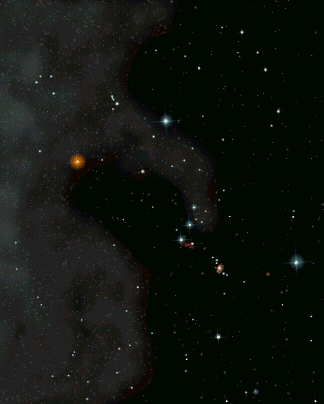"...and there leaned up, as he climbed over the rim of the world, the
Swordsman of the Sky, Menelvagor with his shining belt. The
Elves all burst into song."
From The Fellowship of the Ring I 3
Three is Company

Menelvagor with his shining belt. The brilliant red star that marks the
Swordsman's shoulder is known as
Borgil.
Menelvagor, the Swordsman of the Sky, was the name given by the Elves of Middle-earth to the bright and prominent star-group that we know today as Orion.
The stars of Menelvagor were originally given their shape in the sky by Varda, who in Middle-earth has the name Elbereth, 'Star-lady'. In an ancient time when Melkor still lurked in Utumno, she used the stars to fill the sky with symbols of watchfulness and guardianship. Together with the Valacirca,1 Menelvagor was one of the two most important of these.
‘The Elves all burst into song.’
To the Elves, this constellation had huge symbolic importance, representing an eternal guardian of the world. In the oldest tradition, The Lost Tales, Menelvagor is the enemy of the exiled Melkor, protecting Arda from his return. In later developments of the story, the stars came to represent none other than Túrin Turambar,2 who was fated to return from the dead and face Melkor in the Last Battle. This tradition can be seen in the words of the Silmarillion, where Menelvagor (there called Menelmacar) 'forebodes the Last Battle that shall be at the end of days.' (3 Of the Coming of the Elves and the Captivity of Melkor).
Reading the Star Clock
Menelvagor's appearance in The Lord of the Rings gives us an extra glimpse of detail that might easily be missed: he acts as an immense and spectacular 'clock' that lets us time the action exactly. The action in question is Frodo's encounter with Gildor and the Elves, as he leaves the Shire on his fateful journey.
We know from The Tale of Years that this encounter took place on the night of 24 Halimath, which equates on our calendar to 15 September. We also know that Menelvagor had just 'climbed over the rim of the world'. For any given date, a constellation will always rise at the same time each year: if we do the appropriate calculations, we discover that the Elves started singing at about ten past one in the morning.3
Notes
1 |
'The Sickle of the Valar': the stars of Ursa Major that we know today as the Plough or Big Dipper. |
2 |
If Menelvagor represents Túrin, then his sword represents Gurthang, Túrin's famous black weapon. Bearing this in mind, perhaps it is significant that the iron used to forge Gurthang itself came from the sky as a meteorite - the sword's original name was Anglachel, meaning 'Iron of the Flaming Star'. |
3 |
For those with a technical turn of mind, this is calculated from the point at which the southernmost star of the body of Menelvagor (Kappa Orionis or Saiph) crosses the eastern horizon in the early morning of 16 September each year. This turns out to be 01:07, Greenwich Mean Time (which we're treating as equivalent to 'Shire Mean Time' for the purposes of this diversion!).
For those with an even more technical turn of mind, it's relevant to point out that we're ignoring the implications of precession in these figures. The effect known as the precession of the equinoxes means that it isn't quite true to say that constellations rise at the same time each year: actually, the nature of the Earth's rotation causes its alignment with the sky to shift over a cycle of about 26,000 years. That means that the rising of the constellations changes over a period of millennia, a fact that's potentially relevant because Frodo's encounter with the Elves took place thousands of years ago. That effect can potentially make quite some difference; if we assume that these events took place about six thousand years ago, then the actual rising of Orion would take place somewhat earlier than 01:07. (The figure of six thousand years comes from a comment made by Tolkien in his Letters - see the supplementary information on the entry for the Fourth Age for more details.)
|
Indexes:
About this entry:
- Updated 27 November 1999
- This entry is complete
For acknowledgements and references, see the Disclaimer & Bibliography page.
Original content © copyright Mark Fisher 1997-2000. All rights reserved. For conditions of reuse, see the Site FAQ.
Website services kindly sponsored by Axiom Discovery aptitude and skill testing.
Personality is one part of understanding a candidate's suitability for a role, but aptitude can also be crucial.

